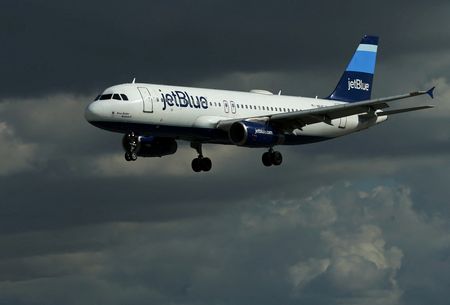By Nate Raymond
BOSTON (Reuters) -The U.S. argued on Tuesday that JetBlue Airways’ planned $3.8 billion acquisition of ultra-low-cost carrier Spirit Airlines will lead to higher fares and fewer flights, as the Justice Department urged a federal judge to block the deal at the start of a closely-watched antitrust trial.
The case in federal court in Boston is part of a broad effort by President Joe Biden’s administration to preserve competition among the lowest cost airlines, ensuring air travel remains affordable for many more US consumers.
Justice Department attorney Arianna Markel in her opening statement told U.S. District Judge William Young, who will decide the case, that the deal would lead to fewer flights and seats and higher prices for millions of Americans.
She said a JetBlue internal analysis projected its fares would increase 30% once Spirit, which competes with JetBlue on around 100 routes nationally, is not a competitor. Passengers would suffer roughly $1 billion in net harm annually, she said.
“JetBlue is counting on the fact that eliminating Spirit and the competition Spirit provides will allow JetBlue to raise fares,” Markel said. “That is real harm to real people.”
To underscore that point, another Justice Department lawyer Aaron Teitelbaum later questioned Spirit CEO Ted Christie about an internal analysis showing how his no-frills, low-cost airline’s entry into various markets had had an industry-wide effect of driving down prices.
Christie acknowledged he originally opposed a merger with JetBlue, favoring a since-scrapped combination with Frontier Group Holdings , saying he had been “skeptical” of JetBlue’s proposal and concerned about how regulators would view it.
“That has changed over time,” he said, without being pressed by Teitelbaum as to what he meant.
He returns to the witness stand Wednesday, when he will be questioned by the companies’ lawyers.
JetBlue attorney Ryan Shores told the judge that the case was a “misguided” challenge to a merger between the nation’s sixth and seventh largest airlines, which combined control less than 8% of a domestic market dominated by four larger airlines.
Those four U.S. carriers – United Airlines, American Airlines, Delta Air Lines and Southwest Airlines – control 80% of the market following a series of previous airline mergers that the federal government blessed, Shores said.
Yet Shores said the government was trying to bar JetBlue, long known for its own low-cost model, from becoming a bigger challenge to those four airlines and disrupting a market that has become “bad for competition and bad for consumers.”
“The government in this case has lost the forest for the trees,” Shores said.
The trial began on the same day JetBlue posted lower-than-expected third-quarter results, citing air traffic control and weather delays during the summer travel season, and projected a larger-than-expected fourth-quarter loss.
Its shares were down 11.7% in midday trading.
JetBlue has called the deal pro-consumer and has sought to ease U.S. regulators’ antitrust concerns by agreeing to sell off Spirit’s gates and slots at certain airports in New York City, Boston, Newark and Fort Lauderdale.
But the Justice Department has said those divestitures are not enough, and sued in March to block the deal. It is suing alongside Democratic attorneys general from six states and the District of Columbia.
The department’s case is part of a broader push by the Biden administration to aggressively step up antitrust enforcement, an initiative that has had mixed results in court.
JetBlue was already the focus of one of its earlier cases, with a different Boston judge, Leo Sorokin, in May siding with the government in finding that JetBlue’s U.S. Northeast partnership with American Airlines violated antitrust law.
JetBlue subsequently decided to terminate the alliance. American Airlines is appealing Sorokin’s decision.
(Reporting by Nate Raymond in Boston, Additional reporting by Jonathan Stempel in New York; Editing by Alexia Garamfalvi, Nick Zieminski and Marguerita Choy)





